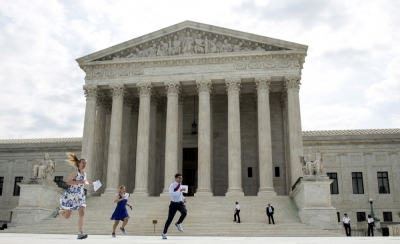Exempt Christian Schools From Birth Control Mandate, 16 States Tell Supreme Court

Sixteen states have filed an amicus brief in support of three Christian academic institutions that have sued the Health and Human Services Department due to religious objections to the birth control mandate.
The brief was filed Monday on behalf of Houston Baptist University, East Texas Baptist University, and Westminster Theological Seminary, who are appealing to the U.S, Supreme Court to get an exemption from the HHS mandate.
Attorneys General listed in the brief represent the states of Alabama, Arizona, Florida, Georgia, Kansas, Louisiana, Michigan, Montana, Nevada, Ohio, Oklahoma, South Carolina, South Dakota, Texas, Utah, and West Virginia.
The states argue that the three academic institutions have "a sincere religious conviction that complying with the disputed mandate is forbidden."
The AG's also support giving the religious schools the same exemption given to churches.
"The government already accommodates that religious conviction by providing an exemption
for churches," continued the summary.
"Petitioners share with churches the same religious conviction about providing health insurance
without contracting with companies that will then have to pay for drugs regarded as abortifacients. The sincerity of that religious conviction is not disputed."

In October 2012, East Texas Baptist and Houston Baptist filed a lawsuit against HHS over the preventive services mandate, taking specific issue with the four FDA approved abortifacients required by the mandate.
In March 2013, Westminster Theological Seminary of Glenside filed a motion to intervene in the lawsuit on behalf of the two Baptist universities.
James M. Sweet, an attorney and vice president for Institutional Advancement at Westminster Theological Seminary, told The Christian Post in 2013 that the issue was not over contraception.
"We have no issue with contraception as we make clear in our papers," said Sweet. "Our issue is with the required inclusion of so-called abortifacient drugs that the government, through the mandate, requires be present in our policy or, alternatively, if we seek the accommodation offered by the government, in the policies of each and every one of our employees."
Initially the three institutions were successful in getting an exemption from the mandate, when a federal judge ruled against HHS in December 2013.
However, in June a three judge panel of the Fifth Circuit Court of Appeals overturned the lower court ruling, arguing that the institutions were not substantially burdened by the mandate.
"Because the plaintiffs have not shown and are not likely to show that the requirement substantially burdens their religious exercise under established law, we reverse," concluded the panel.
Last month, the Christian academic institutions filed an appeal with the highest court in the land seeking an exemption from the HHS mandate.
"Petitioners are two religious colleges and a theological seminary that provide generous healthcare plans to their employees. Those plans include free access to fourteen different kinds of contraceptives," read the petition for appeal.
"But those plans exclude four types of contraceptives that petitioners believe constitute abortifacients. No one doubts the sincerity of petitioners' religious beliefs. Nonetheless, the Department of Health and Human Services believes that petitioners' employees must have free access to those four contraceptives under the auspices of petitioners' plans in order for petitioners to comply with the Affordable Care Act and the agency's contraceptive mandate and to avoid draconian penalties."
The two Texas universities are being represented by the Becket Fund for Religious Liberty, a legal group that has overseen dozens of lawsuits against the HHS mandate.
In addition to the 16 states, groups including the Ethics and Religious Liberty Commission of the Southern Baptist Convention, the Christian and Missionary Alliance Foundation, the Alliance Community for Retirement Living, and the Council of Christian Colleges and Universities have filed their own amicus briefs on behalf of the three Christian academic institutes.
"It is especially significant that 16 state governments are supporting HBU and ETBU at the Supreme Court," said Diana Verm, legal counsel at the Becket Fund, in a statement.
"This strong show of support for HBU and ETBU demonstrates just how important it is that the Supreme Court address the impact of the HHS mandate, particularly on religious groups."





















